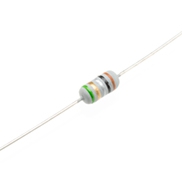 The new CRP Series was developed from the widely popular CR Series especially for applications with high pulse requirements. These are precision wire wound resistors with a ceramic core and a small design in the power classes 2, 3 and 5 watts. The resistor element is protected by a flameproof lacquer coating according to UL94-V0.
The new CRP Series was developed from the widely popular CR Series especially for applications with high pulse requirements. These are precision wire wound resistors with a ceramic core and a small design in the power classes 2, 3 and 5 watts. The resistor element is protected by a flameproof lacquer coating according to UL94-V0.
Features:
- Precision wire resistors
- Flameproof coating UL94-V0
- Tolerances: 0.5%, 1%, 2% and 5%
- Pulse voltages up to 6 kV
- Power rating: 1W, 2W, 3W and 5W
- Small designs: 0309, 0410, 0613 and 0818
- Resistance range: 0R1 to 5K1
Vitrohm has an excellent reputation of being a high quality manufacturer of resistive products for decades. Specialized in producing different kinds of wirewound resistors (coated, molded, ceramic or aluminum housed) and film resistors (metal glaze, metal oxide) either surface mount or through hole mountable. Besides offering standard versions there is always the possibility in offering extended specifications and custom resistors with higher pulse capability.
Pulse resistors are used in applications where electrical pulses or transient currents are involved. These resistors are engineered to withstand the high energy levels, quick rise times, and fast fall times often associated with pulse applications.
-
High Pulse Energy Handling: Pulse resistors are designed to handle high levels of energy for short durations, making them suitable for applications where brief, high-energy electrical pulses are common.
-
Fast Response Time: They have a fast response time, meaning they can quickly dissipate the energy from incoming pulses without sustaining damage or significant temperature rise.
-
Accuracy and Stability: Pulse resistors are known for their accuracy and stability in applications where precision is crucial.
-
Non-Inductive Designs: Many pulse resistors are designed to be non-inductive to minimize the effects of inductance on the pulse response.
-
Resistance Range: These resistors come in a variety of resistance values, allowing engineers to select the appropriate resistance for their specific application.
-
Construction: Pulse resistors can be made from different materials, including wirewound, metal film, or carbon composition, depending on the specific requirements of the application.
-
Applications: Pulse resistors are used in various applications, including in telecommunications, pulse power, medical devices, radar systems, and high-frequency test equipment.
 The new CRP Series was developed from the widely popular CR Series especially for applications with high pulse requirements. These are precision wire wound resistors with a ceramic core and a small design in the power classes 2, 3 and 5 watts. The resistor element is protected by a flameproof lacquer coating according to UL94-V0.
The new CRP Series was developed from the widely popular CR Series especially for applications with high pulse requirements. These are precision wire wound resistors with a ceramic core and a small design in the power classes 2, 3 and 5 watts. The resistor element is protected by a flameproof lacquer coating according to UL94-V0.